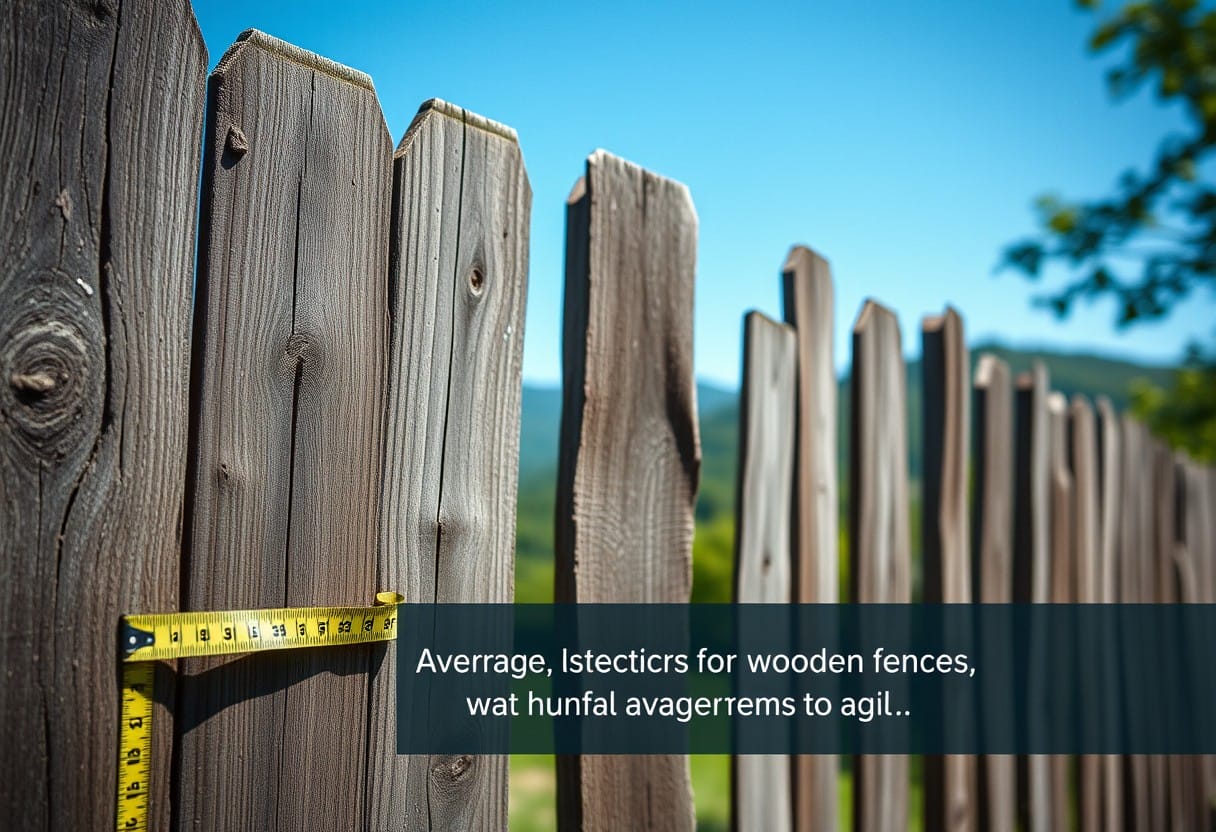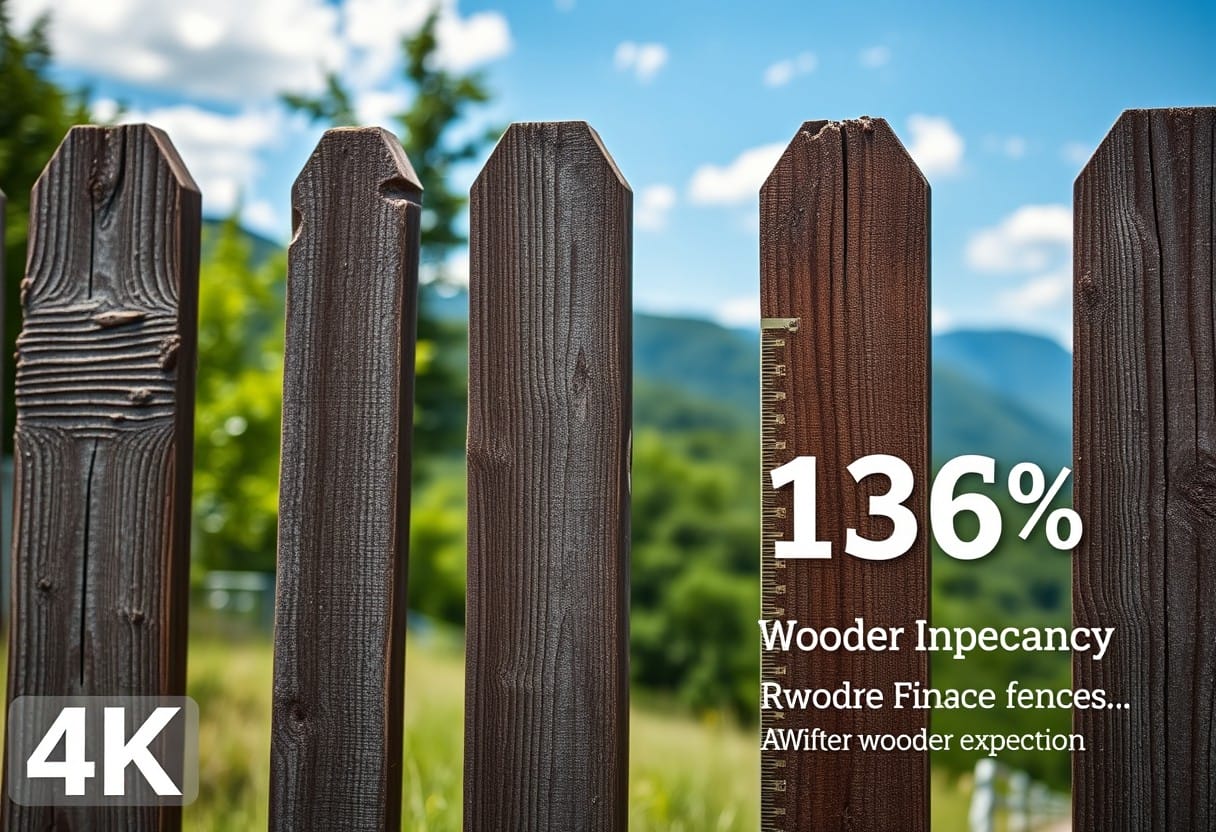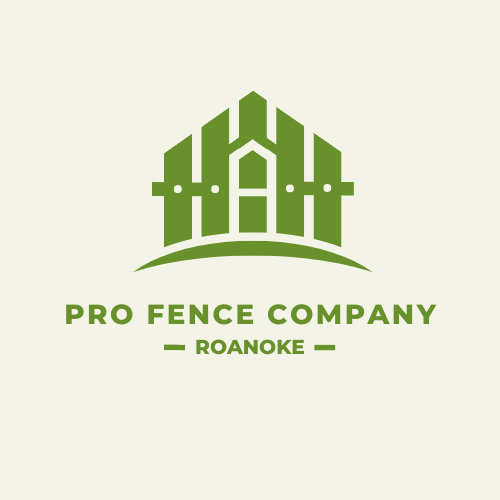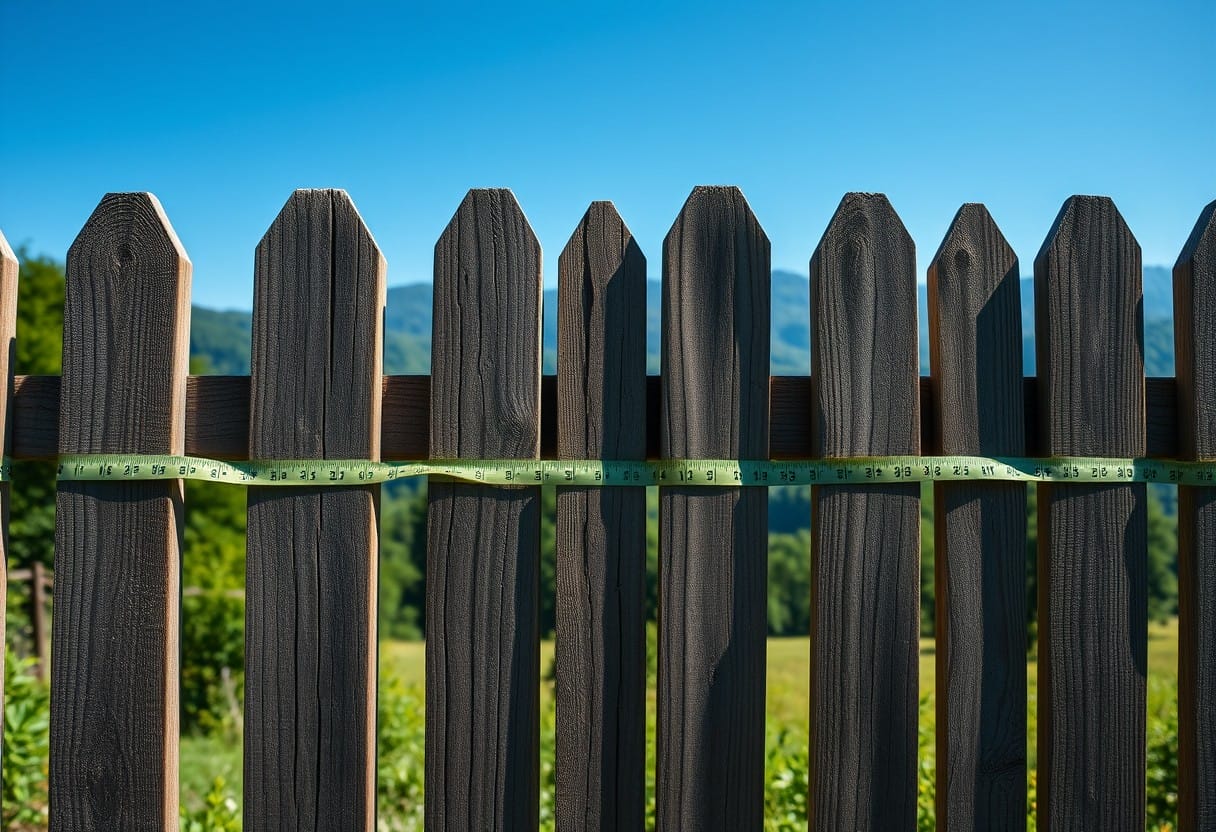Wood fences are a popular choice for adding privacy and beauty to your property in Roanoke, VA. However, knowing the life expectancy of your fence can help you plan for maintenance or replacement. Factors such as the type of wood, weather conditions, and how well you care for it play critical roles in its longevity. In this post, you will discover the typical life span of wood fences in your area, as well as tips to maximize their durability.

Key Takeaways:
- Typical Lifespan: A wood fence in Roanoke VA typically lasts between 15 to 20 years, depending on maintenance and weather conditions.
- Impact of Weather: Local climate factors such as humidity and rainfall can affect the longevity of wood fences, making regular maintenance crucial.
- Maintenance Matters: Proper treatment, such as staining and sealing, can significantly extend the life expectancy of a wood fence in Roanoke.
Factors Affecting Life Expectancy
To understand the life expectancy of a wood fence in Roanoke, VA, it’s crucial to consider various factors that can influence its durability and longevity. Some of these factors include:
- Type of wood used
- Climate and weather conditions
- Treatment and maintenance practices
- Installation quality
Perceiving these factors will help you make informed decisions about your wood fence investment.
Type of Wood
On choosing the right type of wood for your fence can dramatically impact its life expectancy. Hardwoods like oak or cedar tend to resist rot and insects better than softer woods such as pine. Your choice of wood plays a pivotal role in sustaining your fence’s integrity over time.
Climate and Weather Conditions
Weather patterns in Roanoke can have a significant effect on your wood fence. Frequent rainfall, high humidity, and temperature fluctuations can accelerate degradation. Being aware of these conditions helps you prepare your fence for potential weather-related concerns.
Climate plays a key role in how long your wood fence lasts. In Roanoke, with its humid subtropical climate, moisture can lead to wood rot, while extreme temperatures can cause warping or cracking. It’s crucial to consider these climate factors when selecting materials and planning maintenance routines for your fence.
Treatment and Maintenance Practices
An effective treatment and maintenance schedule can extend the life of your wood fence significantly. Regular staining, sealing, or painting helps protect the wood from moisture and UV rays. By actively maintaining your fence, you can mitigate the effects of wear and tear.
This consistent care not only enhances the aesthetic appeal of your fence but also prevents premature deterioration. Scheduling an annual inspection can help you catch any issues early, ensuring your fence remains strong and functional for years to come.
Installation Quality
An improperly installed fence could lead to a quicker decline in its lifespan. Ensuring that your fence is installed at the correct depth and is well-supported will prevent issues related to structural integrity. Attention to detail during installation plays a crucial role in durability.
Affecting various elements such as soil composition, drainage, and alignment, the installation quality can determine how well your fence withstands environmental challenges. Investing in professional installation can spare you from costly repairs and frequent replacements down the line.

Common Types of Wood Fences in Roanoke
The type of wood fence you choose is crucial for its longevity and aesthetic appeal. In Roanoke, VA, several types of wood fences are commonly used. Here’s a breakdown of each type:
| Type of Wood | Characteristics |
|---|---|
| Cedar | Natural resistance to decay, lightweight, and aromatic. |
| Pine | Cost-effective, easily treated, and available in various styles. |
| Redwood | Highly durable, resistant to pests, and rich in color. |
| Composite Materials | Mixture of wood fibers and plastic, low maintenance, and resistant to warping. |
The choices you make impact not only the lifespan of your wood fence but also its overall appeal. You may want to check the local regulations regarding Fences & Walls | Roanoke, VA to ensure compliance.
Cedar
With its natural oils, cedar wood is known for being resistant to moisture and decay, making it a preferred choice for outdoor fencing in Roanoke. Its lightweight nature allows for easier installation, and the wood’s pleasant aroma adds to its charm.
Pine
Pine is often chosen for its affordability and versatility. It can be easily treated for enhanced durability and is available in numerous styles to fit any home aesthetic.
Another important aspect of pine fences is that they can be stained or painted to match your property’s exterior. This allows you to customize the look of your fence, ensuring it complements your home’s overall design.
Redwood
Commonly regarded as one of the best choices for fencing, redwood boasts a rich color and remarkable durability. This wood type is highly resistant to both pests and decay, making it a long-lasting option for your fencing project.
Roanoke homeowners often choose redwood for its beauty and strength. The rich reds and warm tones can dramatically enhance your property’s value and curb appeal.
Composite Materials
Materials that combine wood fibers with plastic are becoming increasingly popular for fencing. They offer the appearance of wood while being low-maintenance and resistant to warping and fading.
For instance, composite materials can mimic the look of traditional wood while providing greater durability and the ability to withstand the elements. This makes them an excellent choice for those looking to combine aesthetic appeal with practicality.

Maintenance Tips to Extend Life Expectancy
Unlike many other outdoor structures, a wood fence requires regular upkeep to maximize its lifespan. Implementing a few maintenance practices can significantly extend the life expectancy of your fence, ensuring it remains sturdy and aesthetically pleasing for years to come. Here are some crucial tips to consider:
- Perform regular inspections for damage or rot.
- Clean your fence periodically to remove dirt and grime.
- Apply proper sealing and staining to protect the wood.
- Address repairs immediately when visible wear occurs.
This proactive approach will help maintain the integrity of your fence in Roanoke, VA.
Regular Inspections
Expectancy of a wood fence can be impacted greatly by environmental factors, so it’s crucial to conduct regular inspections. Look for signs of wear such as cracks, warping, or pest damage. Early detection of issues allows you to take corrective actions before they escalate, thus enhancing the longevity of the fence.
Any accumulation of dirt, mildew, or mold can lead to deterioration of your wood fence. To prevent this, use a gentle cleaning solution and a soft brush or power washer on a low setting. Ensure you follow the grain of the wood to avoid damaging its surface. Regular cleaning not only improves aesthetic appeal but also extends the overall life expectancy of your fence.
Life expectancy is directly influenced by the cleanliness of your fence. Stains from algae and mold can lead to permanent discoloration if not addressed promptly. Using appropriate cleaning methods can help maintain your fence’s appearance and integrity, making it crucial to incorporate into your routine maintenance tasks.
Proper Sealing and Staining
The sealing and staining of your wood fence are critical to its longevity. By applying a protective sealant, you create a barrier against moisture, UV rays, and pests, which can all contribute to wood degradation. Aim for staining every 3-5 years, depending on your local climate conditions.
Staining not only protects but also enhances the natural beauty of the wood. Choose a high-quality stain that repels water and UV rays, as this will further prevent splitting and cracking over time. A well-maintained stain finish can make your fence look new and fresh, ultimately prolonging its life considerably.
Repairs and Upkeep
Staining is only one aspect of maintenance; it’s also vital to address repairs and upkeep promptly. Whenever you notice loose boards or broken pickets, take immediate action to fix them. Neglecting minor repairs can lead to more significant issues down the line, ultimately shortening the life of your fence.
Repairs should be a regular part of your maintenance routine. Inspect your fence for any hardware issues as well, such as loose hinges or rusted nails. Prioritizing these repairs will help maintain the overall structural integrity of your wood fence, ensuring it remains a sturdy boundary for many years to come. For more information on the lifespan of wood fences, you might find this resource on How Long Does a Wood Fence Last? helpful.
Summing up
Considering all points, the life expectancy of a wood fence in Roanoke, VA, typically ranges from 10 to 20 years, depending on various factors like wood type, maintenance, and weather conditions. To maximize your fence’s lifespan, you should ensure proper installation, regular maintenance, and protective treatments. By investing time and effort into care, you can help your wood fence withstand the elements and serve its purpose effectively for years to come.
FAQ
Q: What is the average life expectancy of a wood fence in Roanoke, VA?
A: The average life expectancy of a wood fence in Roanoke, VA, typically ranges from 10 to 15 years. However, this can vary significantly depending on factors such as the type of wood used, the quality of installation, and the local climate conditions. If you want to learn more, Call Pro Fence Company now.
Q: What types of wood are commonly used for fences in Roanoke?
A: Common types of wood used for fencing in Roanoke include cedar, pine, and redwood. Cedar is known for its natural resistance to rot and insects, which can enhance its longevity. Pine is more affordable but may require more maintenance over time. Redwood is also durable but tends to be more expensive.
Q: How can I extend the life of my wood fence?
A: To extend the life of your wood fence, consider regular maintenance such as staining or sealing the wood every few years to protect it from moisture and sun damage. Additionally, ensuring proper drainage around the fence and cleaning off debris regularly can help prevent rot and decay.
Q: Does the climate in Roanoke impact the lifespan of a wood fence?
A: Yes, the climate in Roanoke, which features seasonal temperature extremes and varying levels of humidity, can impact the lifespan of a wood fence. Humidity can lead to mold and rot, while heavy snow and ice can cause physical damage. Using weather-resistant treatments can help mitigate these effects.
Q: What are the signs that my wood fence needs to be replaced?
A: Signs that your wood fence may need to be replaced include visible decay or rot, leaning or instability, cracked or broken boards, extensive insect damage, and fading color or peeling paint. Regular inspections can help you catch these issues early.
Q: Are there any local regulations regarding wood fences in Roanoke?
A: Yes, Roanoke may have zoning regulations and building codes that dictate fence height, placement, and materials. It’s important to check with local authorities or the city’s planning department before installing a wood fence to ensure compliance with all regulations.
Q: Can I DIY my wood fence installation, or should I hire a professional?
A: While DIY installation of a wood fence is possible, hiring a professional may ensure higher quality construction and adherence to local building codes. Professionals also have the experience and tools necessary to handle challenges that may arise during installation, leading to a longer-lasting fence.


Leave a Reply